-
 Bitcoin
Bitcoin $84,800.7048
2.32% -
 Ethereum
Ethereum $1,882.5584
2.87% -
 Tether USDt
Tether USDt $1.0000
0.01% -
 XRP
XRP $2.0968
-0.03% -
 BNB
BNB $603.2602
-0.62% -
 Solana
Solana $124.5532
-0.44% -
 USDC
USDC $0.9999
-0.02% -
 Dogecoin
Dogecoin $0.1707
1.90% -
 Cardano
Cardano $0.6689
0.47% -
 TRON
TRON $0.2384
0.86% -
 Toncoin
Toncoin $4.0121
-3.28% -
 Chainlink
Chainlink $13.7734
0.97% -
 UNUS SED LEO
UNUS SED LEO $9.4100
2.89% -
 Stellar
Stellar $0.2672
0.86% -
 Avalanche
Avalanche $19.2693
1.92% -
 Sui
Sui $2.3662
2.82% -
 Shiba Inu
Shiba Inu $0.0...01237
-2.05% -
 Hedera
Hedera $0.1657
1.14% -
 Polkadot
Polkadot $4.0848
0.85% -
 Litecoin
Litecoin $82.9308
-0.63% -
 MANTRA
MANTRA $6.2006
-1.38% -
 Bitcoin Cash
Bitcoin Cash $304.9806
0.27% -
 Bitget Token
Bitget Token $4.5883
-0.15% -
 Dai
Dai $1.0001
0.02% -
 Ethena USDe
Ethena USDe $0.9998
-0.01% -
 Pi
Pi $0.6918
-2.64% -
 Hyperliquid
Hyperliquid $13.0896
-1.19% -
 Monero
Monero $218.5433
0.66% -
 Uniswap
Uniswap $6.1491
2.50% -
 Aptos
Aptos $5.2452
-0.95%
How to import private keys in Bybit wallet?
Bybit doesn't support direct private key imports; instead, deposit crypto using Bybit's provided addresses to access your assets securely.
Mar 29, 2025 at 12:28 pm
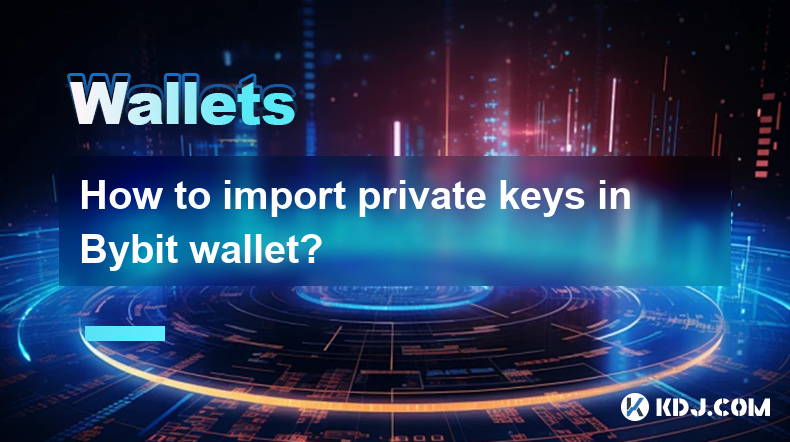
Bybit, a popular cryptocurrency exchange, doesn't directly offer a feature to import private keys into its own wallet in the same way some other wallets do. Bybit's primary function is as an exchange, not a self-custodial wallet in the traditional sense. Therefore, the question of directly importing private keys into a Bybit "wallet" needs clarification. What you're likely aiming for is to access the crypto assets associated with those private keys through your Bybit account.
Understanding Bybit's Approach to Security
Bybit prioritizes security by managing user funds within its own secure infrastructure. This differs significantly from wallets where you directly control the private keys. Your assets on Bybit are held within their system, and accessing them doesn't involve directly importing private keys into a Bybit-specific wallet interface. Instead, the focus is on securely linking your existing crypto holdings to your Bybit account.
Methods for Accessing Your Crypto Assets on Bybit
There are several ways to access your existing crypto assets through your Bybit account, even if you possess their private keys:
Depositing Cryptocurrencies: This is the standard and recommended method. If you hold cryptocurrencies in a different wallet, you can initiate a deposit to your Bybit account using the provided deposit address. This address is unique for each cryptocurrency and is generated by Bybit. The private key remains with your original wallet; Bybit only receives the cryptocurrency itself.
Transferring from Another Exchange: If your crypto assets are on another exchange, you can transfer them to your Bybit account. This involves initiating a withdrawal from the other exchange and providing your Bybit deposit address as the recipient. Again, the private key remains with the originating exchange or wallet.
Using a Third-Party Wallet (Indirect Method): While Bybit doesn't directly support private key imports, you could use a third-party wallet that does support private key imports. You would then transfer your crypto from that third-party wallet to your Bybit account using the deposit method described above. This is an indirect approach, but it leverages the functionality of a separate wallet.
Important Note: Never share your private keys with anyone, including Bybit support. Compromising your private keys could lead to the irreversible loss of your crypto assets. Always verify the deposit address on Bybit before initiating any transfers.
The Importance of Secure Private Key Management
The security of your crypto assets hinges on the secure storage and management of your private keys. Never store your private keys on insecure devices or platforms. Consider using hardware wallets for enhanced security. Hardware wallets provide an extra layer of protection, isolating your private keys from potential online threats.
Hardware Wallets: These physical devices store your private keys offline, making them significantly more secure against hacking and malware. Examples include Ledger and Trezor.
Software Wallets: These wallets store your private keys on your computer or mobile device. While more convenient, they're also more vulnerable to security breaches if not properly secured.
Paper Wallets: These involve printing your private keys and public addresses on paper. While offering offline security, they're vulnerable to physical damage or loss.
Remember to always double-check the addresses when sending cryptocurrencies to avoid irreversible losses. Carefully research and choose a storage method that aligns with your risk tolerance and technical expertise.
Understanding the Differences Between Exchanges and Wallets
It's crucial to understand the fundamental differences between a cryptocurrency exchange like Bybit and a self-custodial wallet. Exchanges are platforms where you can buy, sell, and trade cryptocurrencies. They hold your assets in their custody. Wallets, on the other hand, allow you to directly manage your private keys and control your crypto assets. Bybit primarily functions as an exchange, not a self-custodial wallet.
Security Best Practices for Cryptocurrency Users
Maintaining the security of your crypto assets requires a multi-faceted approach. This includes:
Strong Passwords: Use strong, unique passwords for all your cryptocurrency accounts and wallets.
Two-Factor Authentication (2FA): Enable 2FA whenever possible to add an extra layer of security.
Regular Software Updates: Keep your software wallets and operating systems updated to patch security vulnerabilities.
Beware of Phishing Scams: Be cautious of suspicious emails, links, or messages that may try to steal your credentials.
Regularly Back Up Your Keys: Regularly back up your private keys to prevent loss due to hardware failure or other unforeseen circumstances. Store these backups securely and offline.
Frequently Asked Questions
Q: Can I directly import my private keys into Bybit?
A: No, Bybit does not offer a direct private key import function. You should deposit your cryptocurrencies via the provided deposit addresses.
Q: What if I lose my private keys?
A: If you lose your private keys, you will likely lose access to the cryptocurrencies associated with those keys. There is no recovery mechanism for most cryptocurrencies.
Q: Is it safe to store my crypto on Bybit?
A: Bybit employs security measures to protect user funds, but it's crucial to remember that holding crypto on an exchange introduces counterparty risk. Consider diversifying your holdings across different platforms and storage methods.
Q: What are the risks of using a third-party wallet to transfer funds to Bybit?
A: Using a third-party wallet introduces additional risks, including the possibility of errors during the transfer process or vulnerabilities within the third-party wallet itself. Always verify the addresses before initiating any transfers.
Q: How do I withdraw my crypto from Bybit?
A: To withdraw crypto from Bybit, you'll need to provide a withdrawal address and follow Bybit's withdrawal procedures. Ensure the withdrawal address is correct to avoid irreversible loss of funds.
Disclaimer:info@kdj.com
The information provided is not trading advice. kdj.com does not assume any responsibility for any investments made based on the information provided in this article. Cryptocurrencies are highly volatile and it is highly recommended that you invest with caution after thorough research!
If you believe that the content used on this website infringes your copyright, please contact us immediately (info@kdj.com) and we will delete it promptly.
- Mastercard Launches Multi-Token Network (MTN) to Connect Traditional Finance and Digital Assets
- 2025-04-02 10:35:12
- LCX is set to participate in the Paris Blockchain Week, which commences on April 8th in Paris.
- 2025-04-02 10:35:12
- FIO Protocol's head of marketing, Marie Grig, will participate in Paris Blockchain Week
- 2025-04-02 10:30:12
- DTX Exchange (DTX) Token Price Prediction: Will the DTX Presale Ever End?
- 2025-04-02 10:30:12
- Binance's Routine Contract Rule Adjustment Accidentally Exposed the Most Vulnerable Pimple in the Crypto Market
- 2025-04-02 10:25:12
- 3 To 6 Months Old Bitcoin Buyers Have Been Holding Strong Recently, Showing Conviction Not Capitulation
- 2025-04-02 10:25:12
Related knowledge
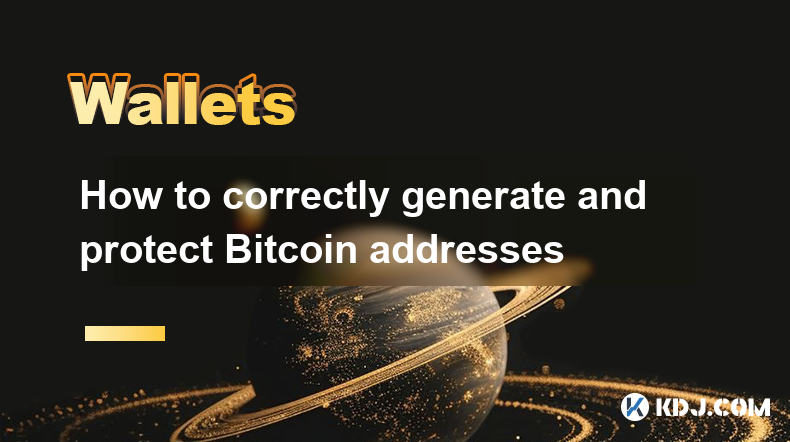
How to correctly generate and protect Bitcoin addresses
Apr 02,2025 at 06:49am
Understanding Bitcoin AddressesA Bitcoin address is like your bank account number. It's a unique identifier that allows others to send you Bitcoin. Unlike a bank account, however, Bitcoin addresses are generated cryptographically and are linked to your private keys. Losing your private keys means losing access to your Bitcoin. Therefore, generating and...
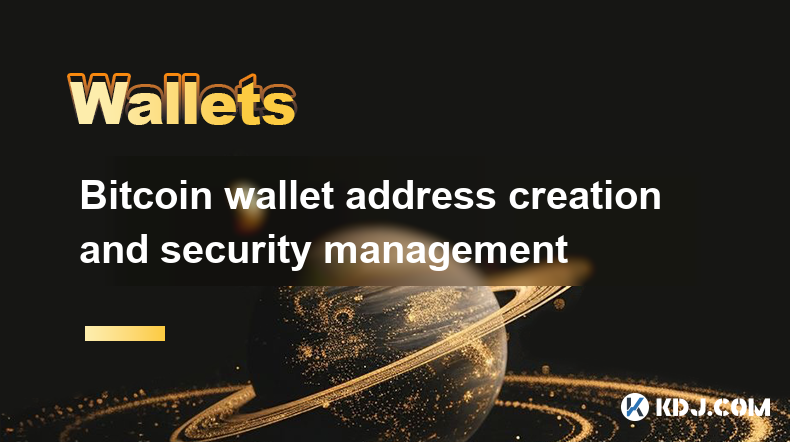
Bitcoin wallet address creation and security management
Mar 31,2025 at 10:56pm
Understanding Bitcoin Wallet AddressesA Bitcoin wallet doesn't store Bitcoin directly. Instead, it stores private keys which are long strings of characters. These keys grant access to your Bitcoin. Your public key, derived from the private key, is used to generate your Bitcoin wallet address, a unique identifier similar to a bank account number. This a...

How to easily generate a Bitcoin payment address
Mar 29,2025 at 10:49am
Generating a Bitcoin payment address might seem daunting, but it's actually quite straightforward. This process is crucial for receiving Bitcoin, as each transaction requires a unique address. Understanding how this works is fundamental to using Bitcoin effectively. This guide will walk you through the simple steps, regardless of your technical experti...

Bitcoin wallet address generation and verification methods
Apr 01,2025 at 11:01am
Understanding Bitcoin Wallet AddressesA Bitcoin wallet address is a unique identifier, similar to a bank account number, used to receive and send Bitcoin. It's a string of alphanumeric characters, crucial for participating in the Bitcoin network. Understanding how these addresses are generated and verified is paramount for secure Bitcoin transactions. ...
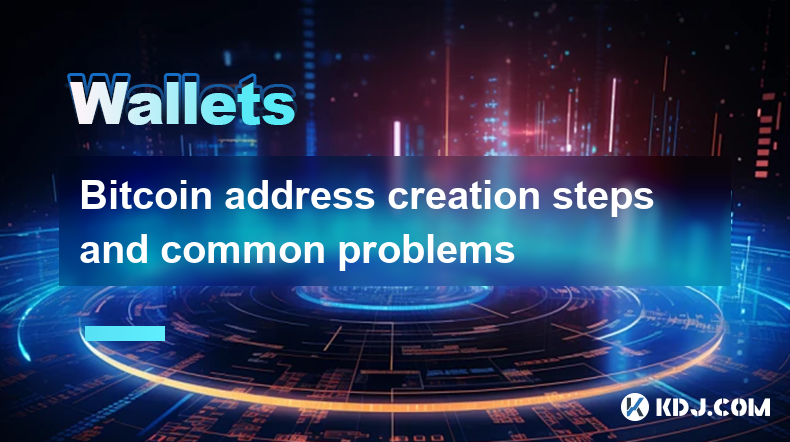
Bitcoin address creation steps and common problems
Mar 30,2025 at 06:07am
Understanding Bitcoin AddressesA Bitcoin address is a unique identifier, similar to a bank account number, used to receive Bitcoin. It's a string of alphanumeric characters generated from a public key, derived from your private key. Understanding the distinction between public and private keys is crucial for Bitcoin security. Your private key should be...
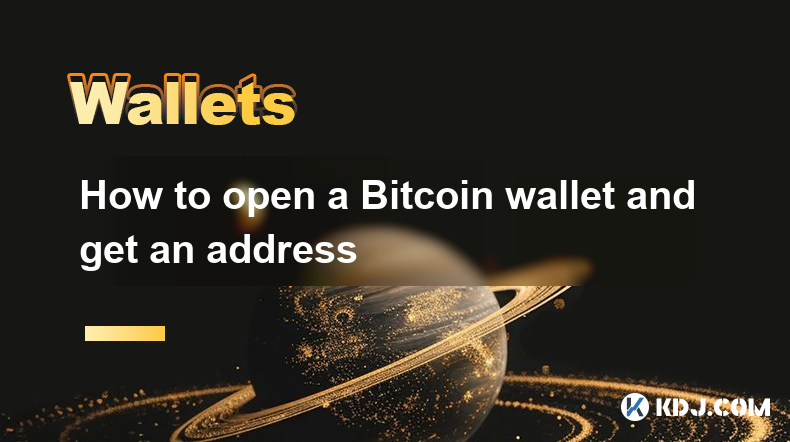
How to open a Bitcoin wallet and get an address
Apr 02,2025 at 04:36am
Choosing the Right Bitcoin WalletBefore diving into the specifics of opening a wallet and obtaining your address, it's crucial to understand the different types of Bitcoin wallets available. The best choice depends on your technical skills, security needs, and how frequently you plan to use your Bitcoin. Options include: Software wallets: These are app...

How to correctly generate and protect Bitcoin addresses
Apr 02,2025 at 06:49am
Understanding Bitcoin AddressesA Bitcoin address is like your bank account number. It's a unique identifier that allows others to send you Bitcoin. Unlike a bank account, however, Bitcoin addresses are generated cryptographically and are linked to your private keys. Losing your private keys means losing access to your Bitcoin. Therefore, generating and...

Bitcoin wallet address creation and security management
Mar 31,2025 at 10:56pm
Understanding Bitcoin Wallet AddressesA Bitcoin wallet doesn't store Bitcoin directly. Instead, it stores private keys which are long strings of characters. These keys grant access to your Bitcoin. Your public key, derived from the private key, is used to generate your Bitcoin wallet address, a unique identifier similar to a bank account number. This a...

How to easily generate a Bitcoin payment address
Mar 29,2025 at 10:49am
Generating a Bitcoin payment address might seem daunting, but it's actually quite straightforward. This process is crucial for receiving Bitcoin, as each transaction requires a unique address. Understanding how this works is fundamental to using Bitcoin effectively. This guide will walk you through the simple steps, regardless of your technical experti...

Bitcoin wallet address generation and verification methods
Apr 01,2025 at 11:01am
Understanding Bitcoin Wallet AddressesA Bitcoin wallet address is a unique identifier, similar to a bank account number, used to receive and send Bitcoin. It's a string of alphanumeric characters, crucial for participating in the Bitcoin network. Understanding how these addresses are generated and verified is paramount for secure Bitcoin transactions. ...

Bitcoin address creation steps and common problems
Mar 30,2025 at 06:07am
Understanding Bitcoin AddressesA Bitcoin address is a unique identifier, similar to a bank account number, used to receive Bitcoin. It's a string of alphanumeric characters generated from a public key, derived from your private key. Understanding the distinction between public and private keys is crucial for Bitcoin security. Your private key should be...

How to open a Bitcoin wallet and get an address
Apr 02,2025 at 04:36am
Choosing the Right Bitcoin WalletBefore diving into the specifics of opening a wallet and obtaining your address, it's crucial to understand the different types of Bitcoin wallets available. The best choice depends on your technical skills, security needs, and how frequently you plan to use your Bitcoin. Options include: Software wallets: These are app...
See all articles























































































